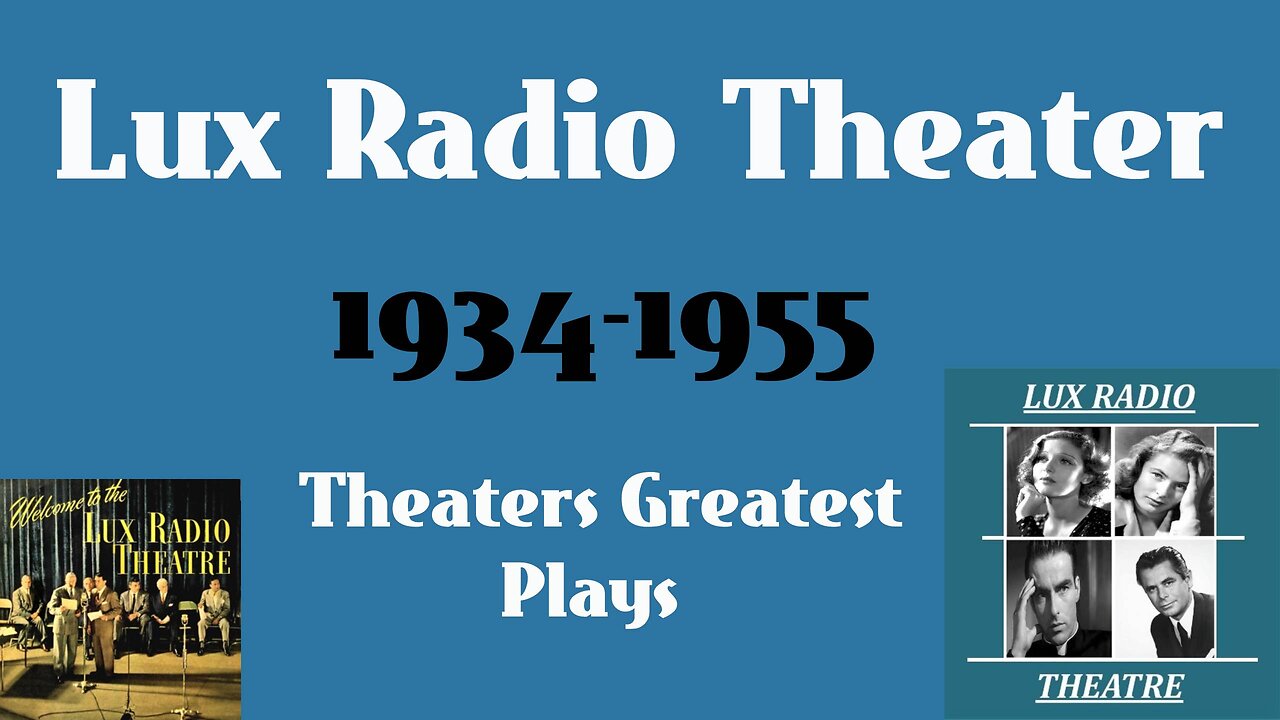Premium Only Content

Lux Radio 37-03-08 ep123 Madame Butterfly (Cary Grant)
At Goro's Tea House, we are introduced to Cho-Cho San who is bidding farewell to her mother and grandfather. She is about to undergo training as a geisha in exchange for money that will support her family. After the relatives leave, Goro introduces Prince Yamadori, a prospective husband, to Cho-Cho San. When Yamadori finds her withdrawn, Madame Goro explains that Cho-Cho San is high-born and is not yet used to the geisha lifestyle.
Meanwhile, on board an American steamship due to arrive in Japan for several months' stay, Lieutenant Barton (Charlie Ruggles) convinces his friend Lieutenant Ben F. Pinkerton (Cary Grant) that once they arrive to skip the American Counsul's party and plan to enjoy themselves instead. Pinkerton looks at a photograph of a blonde woman inscribed to him 'from Adelaide' and hides it in his clothing trunk......................
The series begins with episode 52 Dulcy. None before this appear to exist.
Lux Radio Theatre was indisputably the biggest, most important, most expensive drama anthology program on radio. It ran from October 14, 1934, until June 7, 1955, then continued on television as Lux Video Theatre until 1957. In all, some 926 episodes were broadcast, providing a record of the most important entertainment events in American theatre and, later, film.
The show was first broadcast on the NBC Blue Network on Sundays at 2:30 PM. The show featured adaptations of successful Broadway plays when it was produced out of New York, such as Seventh Heaven, the first production starring Miriam Hopkins, Smilin' Through, Berkeley Square, Daddy Long Legs, Peg O' My Heart and Way Down East. On July 29, 1935, the show moved to Monday night at 9:00 PM on CBS, where it would stay until June 29, 1954.
The show moved to Hollywood on May 25, 1936 with the production of The Legionnaire and the Lady, based on the film Morocco, starring Marlene Dietrich and Clark Gable. The audience for this production was estimated as high as 40 million. The show featured many of the most important films of the period, adapted to fit the 60 minute time slot.
Some of the titles for 1939 should indicate the caliber and range of shows: Stage Door, Ceiling Zero, So Big, It Happened One Night, The Lives of a Bengal Lancer, Lady for a Day, The Life of Emile Zola, Tovarich, Only Angels Have Wings, The Prisoner of Zenda, The Awful Truth, Wuthering Heights, You Can't Take It With You, The Old Maid and Goodbye, Mr. Chips. For its last season, (1954-1955), the show moved to Tuesday nights at 9 on NBC.
Lux Radio Theatre was always broadcast live, with a studio audience and a full orchestra accompanying the performance and providing musical transitions between scenes. As many film actors were used to numerous takes and not live performance, they sometimes suffered acute stage fright before the show.
However, since most received $5,000 for their performance -- in addition to free publicity for upcoming pictures -- actors appeared in their original screen roles if they were available. Indeed, production would halt, if necessary, on a film if performers were called to appear on Lux. When the actors were not available, others stepped in.
The plays were assembled and rehearsed for a week, in sharp contrast to many other shows, which required a minimal of an actor's time. Regular players for the series included Jim and Marian Jordan, otherwise known as Fibber McGee and Molly. Hosts included Cecil B. DeMille (1936-1945), William Keighley (1945-1952) and Irving Cummings (1952-1955). Directors included Tony Stanford, Frank Woodruff, Fred MacKaye and Earl Ebi.
-
 UPCOMING
UPCOMING
Kimberly Guilfoyle
58 minutes agoTrump Trade Wins, Live with Daniel Turner & Jarrett Stepman | Ep241
2301 -
 LIVE
LIVE
vivafrei
1 hour agoWhat Did Bongino See? The Epstein "Privilege"! Canada Has Become a Dangerous JOKE & MORE!
14,055 watching -

The Quartering
3 hours agoToday's Breaking News With Josie The Red Headed Libertarian, Hannah Claire & Luke Rodkowski
92.4K16 -
 LIVE
LIVE
Dr Disrespect
4 hours ago🔴LIVE - DR DISRESPECT - WARZONE - RAGE ON THE MAIN STAGE
2,052 watching -
 LIVE
LIVE
Akademiks
2 hours agoDrake Tries for another #1?? Kodak vs YB still? Ksoo gets snitched on. Doechii plz stop botting
1,417 watching -
 LIVE
LIVE
The HotSeat
23 minutes agoHate Crimes In Cincy + Hiring A White Girl Makes You A NAZI?!?!
265 watching -
 DVR
DVR
Stephen Gardner
50 minutes ago🔥 RFK Just SHUT DOWN a DISTURBING Problem!
2961 -
 UPCOMING
UPCOMING
Film Threat
5 hours agoVERSUS: SUPERMAN VS. THE FANTASTIC FOUR | Film Threat Versus
209 -
![[Ep 715] The Trump Way: Deals & Peace | Hate Crimes – Brutal Beat Downs | CA Homeless Money Scam](https://1a-1791.com/video/fww1/f5/s8/1/6/3/j/6/63j6y.0kob-small-Ep-715-The-Trump-Way-Deals-.jpg) LIVE
LIVE
The Nunn Report - w/ Dan Nunn
57 minutes ago[Ep 715] The Trump Way: Deals & Peace | Hate Crimes – Brutal Beat Downs | CA Homeless Money Scam
80 watching -
 2:36:55
2:36:55
Nerdrotic
6 hours ago $0.41 earnedCancel Kurtzman Trek | The Fate of the Superhero Film - Nerdrotic Nooner 502
31.9K2